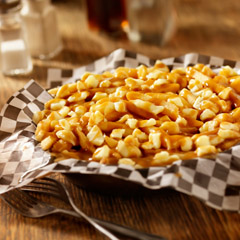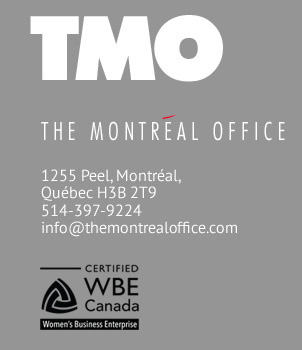
FUN FACTS ABOUT QUÉBEC

CATHOLIC
TO THE CORE
Quebec’s religious legacy
Once referred to as the “Tibet of Catholicism,” for centuries Quebec was a rural, conservative province with a church at the heart of every village. By 1900, there was almost one church official per 100 people (a ratio that makes Starbucks embarrassed). The church’s influence has faded considerably since then, following the Quiet Revolution that secularized the province in the sixties, but it’s still part and parcel of the culture. The province’s spiritual roots are evident in its attitude toward money—most Quebecers believe wealth should be redistributed to those in need, not controlled by the one percent. Mark Twain once remarked that you couldn’t throw a brick in Montreal without breaking a church window, and that’s still the case—it’s just that these days, many of those windows belong to condos in converted churches. And Quebecers continue to invoke the language of the church every day—through the colourful, religion-derived swear words that are an integral part of the local French vernacular. Shout about tabernacles, chalices, ciboriums or hosts, and risk a good old-fashioned Quebec beating … which is really like a regular beating, but most likely in front of a church.


SNOW
GOING!
A distinct winter cultureCIRCUS
REINVENTED
Exporting talent
HUMOUR
IS BIG
A multi-milliondollar business


LESS PILLS
MORE WINE
Quebecers buy differently
GIVING
TO CHARITY
Quebecers “donate”to the lottery
THE
RELIGION
OF HOCKEY
Riot? What riot?
STAYING
UP LATE
Partying till 3 a.m.

FESTIVAL FEVER
Canada’s festival capital
MADE IN QUEBEC
Quebecers like to see themselves on TVSEXUAL ATTITUDE
Quebecers do it better
MARRIAGE? NON MERCI!
Refusing to commit

THE BLOCK QUÉBÉCOIS
Quebecers kinda sorta want their own country
In Quebec, nothing is certain except death, taxes... and talk of separation. The idea of independence is always there, whether at the centre of public debate or bubbling away below the surface. Despite the tub-thumping of politicians, however, many Quebecers get cold feet when asked to commit, and have twice voted against separation in referendums. But the talk goes on... leading to all sorts of oddities: a federal political party, the Bloc Québécois, whose main purpose it to break up the country it represents, or provincial parties with blatantly separatist agendas who dance around the issue of another referendum for fear of losing votes. Quebec humorist Yvon Deschamps summed it up best: “We want an independent Quebec inside a unified Canada.”


LOCAL HEROES
A homegrown star systemPOUTINE
FOR PRESIDENT
A taste for excess
A UNIQUE CAISSE
Quebecers don’t bank on the bank

